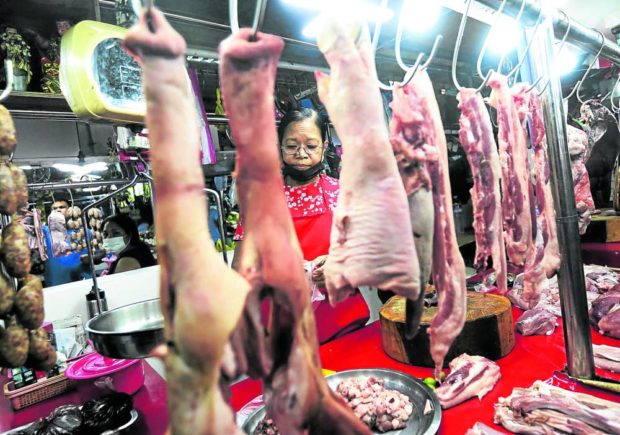Pork producers to Palace: Reconsider import rate modification order

INQUIRER FILE PHOTO
CEBU CITY — A pork-producing federation in the country has appealed to President Ferdinand Marcos Jr. to reconsider his decision to extend the temporary modification of import duty rates on various products, including pork, to ease inflation and supply shortages.
According to Rolando Tambago, president of the Philippine Pork Producers Federation of the Philippines Inc., the group was disappointed with Malacañang’s announcement last Dec. 18.
READ: Marcos extends lower duties on vital food imports
“We’re definitely not happy with the extension of Executive Order (EO) 171 because there is always a way to solve the problem of inflation, particularly involving pork products,” he said in an interview.
Last Dec. 16, President Marcos approved the proposal of the National Economic and Development Authority (NEDA) to extend the temporary modification of import duty rates on various products such as pork, corn, rice, and coal at least until the end of 2023.
EO 171, signed by former President Rodrigo Duterte last May 2022, was supposed to end this year.
President Marcos’ move was intended to mitigate and stabilize the impact of inflationary pressures due to the Ukraine-Russia crisis, expand supply sources, and reduce the prices of key commodities.
Under EO 171, the pork tariff for in-quota imports was reduced from 30 percent to 15 percent while the out-quota import fee was reduced from 40 percent to 25 percent.
In-quota rates apply to products imported within established minimum access volumes (MAV). Any imports over the MAV are assessed at the out-of-quota rate.
MAV products are those for which the government is committed to providing minimum market access in exchange for lifting quantitative import restrictions in the World Trade Organization.
Tambago, who also serves as president of Virginia Farms Inc., said the government does not well support local pork production.
“In terms of competitiveness, we can’t afford imported pork. We really can’t compete with Europe and the United States,” he said.
“While complaining about the actions of the government, we are also doing our best to improve our production efficiency in terms of cost so we won’t eventually import swines,” he added.
Republic Act 10863, or the “Customs Modernization and Tariff Act” empowers the President, in the interest of general welfare and national security, and upon the recommendation of NEDA, to increase, reduce or remove existing rates of import duty.